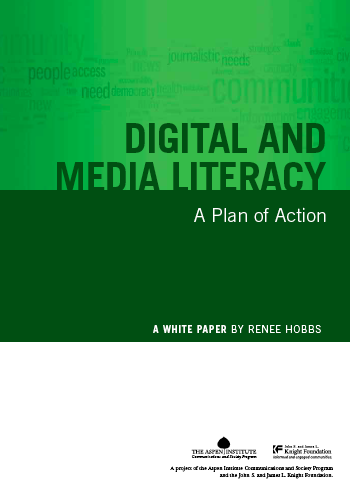Professor Renee Hobbs outlines a plan with specific steps that policymakers, educators, and community advocates can take to develop a community education movement for digital and media literacy.
 In a roundtable discussion with FCC Commissioner Michael Copps, Roberta Stevens, president of the American Library Association and other high-level leaders from government, education and the non-profit sector, participants discussed specific action steps to bring digital and media literacy to all 300 million Americans.
In a roundtable discussion with FCC Commissioner Michael Copps, Roberta Stevens, president of the American Library Association and other high-level leaders from government, education and the non-profit sector, participants discussed specific action steps to bring digital and media literacy to all 300 million Americans.
Whether it’s touch screen computers, smart phones, or user-generated news sites, access to information does not automatically translate into knowing how to use these tools in effective ways that help people in their everyday lives.
All Americans can benefit from learning how to access, analyze, and create digital and media content with thoughtfulness and social responsibility. This was one of the key recommendations of the Knight Commission on the Information Needs of Communities in a Democracy in its landmark report, Informing Communities, issued last year. This blue ribbon commission of 17 luminaries recommended that digital and media literacy be viewed as a critical element in all levels of education, and with institutions such as libraries in local communities.
Ensuring that citizens are equipped with the analytical and communications skills they need to be successful in the 21st century will require a comprehensive plan that positions digital and media literacy as an essential life skill and integrates it into advocacy campaigns, education curricula, and community-based initiatives across the nation. To address this need, Renee Hobbs (founder of the Media Education Lab, Temple University) has outlined a plan with specific steps that policymakers, educators, and community advocates can take to help Americans thrive in the digital age.
To mark the release of the paper and discuss its implications, the Aspen Institute Communications and Society Program and the John S. and James L. Knight Foundation hosted a high-level roundtable discussion featuring representatives from government, education, and other areas Wednesday, November 10, 2010 at the Aspen Institute’s Washington office. The white paper was officially released at the Family Online Safety Institute’s annual conference on Internet Freedom, Safety & Citizenship. This is the second in a series of White Papers focused on the Knight Commission’s 15 recommendations for creating healthy informed communities.
See samples of press coverage here.
Who: Featured Speaker, Renee Hobbs, Professor of Communication and founder of the Media Education Lab, Temple University
Roundtable participants included:
Kat Aaron, Knight Media Policy Fellow, New America Foundation
Kwasi Asare, Associate Director, U.S. Department of Education Office of Educational Technology
Susan Benton, President and CEO, Urban Libraries Council
Mamie Bittner, Deputy Director for Policy, Planning, Research, and Communications, Institute of Museum and Library Services
John Bracken, Director of Digital Media, John S. and James L. Knight Foundation
Robin Bronk, CEO, The Creative Coalition
Idit Caperton, President and Founder, World Wide Workshop Foundation
Michael Copps, Commissioner, Federal Communications Commission
David Crowley, President and Founder, SCI Social Capital Inc.
Charlie Firestone, Executive Director, Communications and Society Program, Aspen Institute
Jessica Goldfin, Journalism Associate, John S. and James L. Knight Foundation
Blair Levin, Communications and Society Fellow, Aspen Institute
Christopher Lohse, Strategic Initiative Director, Information Systems and Research, Council of Chief State School Officers
William Reinhard, Media Relations Director, Maryland State Department of Education
Michael Rich, Director, Center on Media and Child Health
Alan Simpson, Vice President of Policy, Common Sense Media
Roberta Stevens, President, American Library Association
Marijke Visser, Assistant Director, Office of Information Technology, American Association of School Librarians
What: A roundtable discussion on digital and media literacy with key policymakers and other education, technology, and media leaders.
Where: One Dupont Circle, NW, Suite 700, Washington, DC 20036
When: 11:45 a.m. to 2:00 p.m. ET
Agenda: The roundtable will begin with a presentation by Professor Hobbs of her policy paper, followed by discussion among the invited roundtable participants about the recommendations and how they may best be implemented. It will begin with a buffet lunch served at 11:45 a.m.